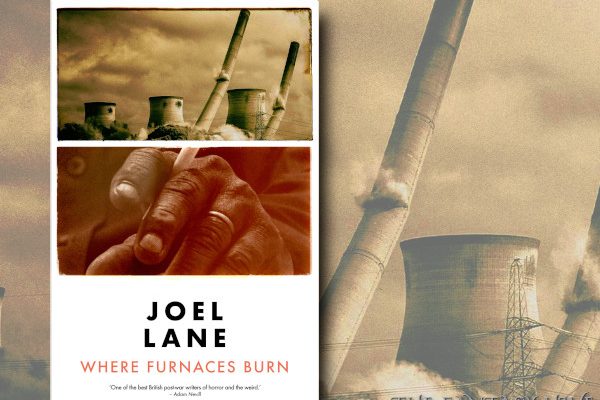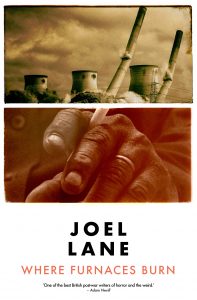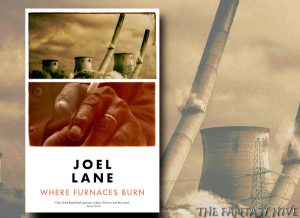WHERE FURNACES BURN by Joel Lane (BOOK REVIEW)

“There’s always a link between deprivation and fantasy.”
“The landscape we were walking through seemed less and less like a place where people had once lived or worked. There was no traffic on the roadway; the only cars were rusted hulks filling up with snow. The buildings looked somehow unfinished, with no loose bricks or exposed structures to suggest a past. The only road signs I saw had been burned to anonymity.”
Before his untimely death, Joel Lane was one of the key authors of modern Weird fiction. I am a huge fan of his two novels, but it’s arguably in his short fiction that we find the most powerful distillation of Lane’s vision, and his most inspiring and enduring work. Where Furnaces Burn (2012) was the final collection published in Lane’s lifetime, and remains one of his key contributions to the literature of the Weird. Told in the form of the notes of a Birmingham police detective, the stories together paint a picture of the West Midlands transfused with the Weird, where the uncanny lurks in every run-down council estate and decaying disused factory. Lane found the horror and the tragedy in the neglected corners of urban Britain, and in doing so became one of their most eloquent and passionate chroniclers. This essential collection has been out of print and impossible to find for years, but thanks to Influx Press’s ongoing reissue campaign, a new generation of fans of the Weird get to enjoy these wonderful and unforgettable stories.
 Where Furnaces Burn follows a police officer over the twenty-four years of his career, as he explores various strange, frightening and downright bizarre occurrences in and around Birmingham. We never find out his name, although we learn a lot about his troubled marriage to his wife Elaine and his estranged daughter Julia, and that his colleagues nickname him Mulder because he keeps getting assigned to the strange cases. Each individual story works brilliantly by itself. But taken together, they document a unique perspective on the industrial West Midlands. Lane creates a new kind of urban fantasy, one in which the uncanny is inextricable from everyday poverty, gang violence and despair fuelled by years of austerity. Our police detective is an ideal witness to the Weird – he is driven by a consuming need to understand what he sees around him, empathic enough to feel for those around him who are consumed by the monsters hiding in the shadows and untethered enough from his own miserable life to feel the pull himself. The stories’ impact stems in part from Lane’s sympathetic portrayal of his characters, those driven new or arcane forms of depravity and destruction by the political realities they inhabit.
Where Furnaces Burn follows a police officer over the twenty-four years of his career, as he explores various strange, frightening and downright bizarre occurrences in and around Birmingham. We never find out his name, although we learn a lot about his troubled marriage to his wife Elaine and his estranged daughter Julia, and that his colleagues nickname him Mulder because he keeps getting assigned to the strange cases. Each individual story works brilliantly by itself. But taken together, they document a unique perspective on the industrial West Midlands. Lane creates a new kind of urban fantasy, one in which the uncanny is inextricable from everyday poverty, gang violence and despair fuelled by years of austerity. Our police detective is an ideal witness to the Weird – he is driven by a consuming need to understand what he sees around him, empathic enough to feel for those around him who are consumed by the monsters hiding in the shadows and untethered enough from his own miserable life to feel the pull himself. The stories’ impact stems in part from Lane’s sympathetic portrayal of his characters, those driven new or arcane forms of depravity and destruction by the political realities they inhabit.
Lane’s stories are anchored by an incredible sense of place. There is an argument to be made for Lane as one of the great chroniclers of Birmingham. His writing is full of gritty detail, and he draws every rotting disused bridge, every crumbling council estate, every abandoned warehouse with unmatched intensity and precision. Lane finds the strange twisted beauty and the inescapable hum of suppressed horror in every one of these modern post-industrial settings, and this is before there is any hint of the fantastical or supernatural. The Birmingham of these stories is a central character as much as any of the people who inhabit it, and utterly inextricable from Lane’s vision. Likewise, Lane has a fascination with the people who inhabit these environs – this is a Weird fiction not concerned with either musclebound heroes fighting terrifying monsters or cloistered academics uncovering horrendous secrets in ancient libraries, but with homeless people, sex workers, drug addicts, the unemployed – people on the margins of society who are frequently in danger of slipping outside of consensus reality. For Lane, this is an explicitly political choice – his stories focus on those who are failed by modern neoliberal society, particularly those in the North of Britain affected by decades of Tory austerity. His police detective makes the connection between the Tory politicians who ruthlessly defund public services and privatize everything and the small-time gangsters who terrorize Birmingham neighbourhoods explicit:
“Most villains are Tories – most successful villains, anyway. You could imagine Thatcher writing fan letters to the Kray twins. Their ideologies were a perfect match: the only community was the family, with its private manor, its rules and its walls.”
So, Lane leads the police detective and his readers on a tour through a world far stranger than we understand, where human agency is mostly an illusion. In ‘Wake Up in Moloch’, while investigating a series of bizarre and unsettling deaths, the police detective uncovers a cult of machine worshipers in Birmingham’s disused factories. A colleague’s family troubles in ‘A Mouth To Feed’ reveal a horrendous pact with a monstrous creature below the ground. The head of a teenage gang is brutally dismembered in ‘Morning’s Echo’, and his lover travels through the police detective’s dreams to piece him together part by part. Faceless monks gather to worship in abandoned churches, murdered children enact violent revenge even as politicians use their tragic story to their own ends, gang members wage war over magical artefacts. This is a world where nothing is as it seems, where every mundane and rundown street hides a brutal secret, where those living on the fringes of society are privy to arcane knowledge. Through it all, the police detective tries to keep his head above the water, as he witnesses the collapse of the West Midlands in the age of austerity, the collapse of his sense of reality, and the collapse of his family life, all leading him to a violent and depraved conflict with an ancient god.
Lane’s stories are frightening and compelling in equal measure. With the benefit of hindsight, it’s easy to see him as one of the prophets of modern Weird fiction, carving out a territory that is home to some of the Weird’s most exciting current voices, from M. John Harrison and Nina Allan through to Malcolm Devlin and Georgina Bruce. When Furnaces Burn is a remarkable display of what can be achieved through the medium of the Weird. In its own way, it’s almost like a very British equivalent to Jeff VanderMeer’s iconic Area X books, showing how the Weird is the most powerful lens through which to approach the myriad complications and disruptions of our modern age. Influx have done us a huge service bringing it back into print, and every enthusiast of the Weird should rush out and read Lane’s short story collections immediately.
Where Furnaces Burn is available now, you can order your copy on Bookshop.org

